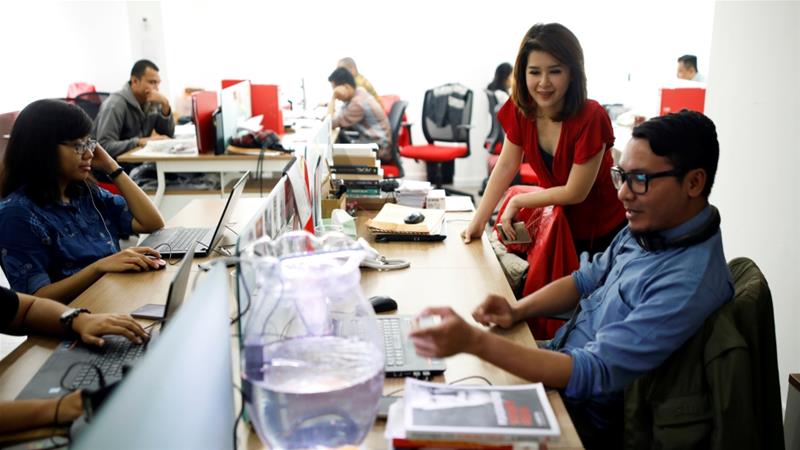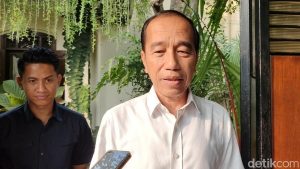A new political party dubbed the “millennials party”, officially called the Indonesian Solidarity Party (PSI), has risen in Indonesia and is set to take part in next years general election.
The PSI is one of four new parties the General Election Commission is allowing to compete in next year’s legislative and presidential elections.
Two of the new parties are fronted by establishment figures. The United Indonesia Party (Perindo) is headed by US President Donald Trump’s business partner in Indonesia, Hary Tanoesoedibjo, while the Berkarya Party is led by Suharto’s youngest son, Tommy, who advocates a return to the “New Order” values of his late father.
Change
PSI leader Grace Natalie, a former television journalist, believes the time has come for a new generation of politicians who would be genuinely accountable to the people.
Its workers call each other “bro” and “sis”, and their leader sets the sartorial standard with a pair of ripped jeans, it hopes to tap into young voters’ contempt for the entrenched corruption and divisive identity politics of the ruling elite.
Her party interviews members seeking nomination for a seat in parliament, and live-streams the discussions on social media platforms. Teachers, corporate lawyers, doctors and bankers are among those whose interviews have aired on Facebook and YouTube.
“No other party is offering what we are in terms of transparency,” she told Reuters at PSI’s headquarters – referred to by party staff as “base camp” – where a wall poster says “Make Art, Not War”.
The downfall of the long-serving Suharto in 1998 – amid a crisis widely blamed on a culture of nepotism and corruption was seen as the beginning of change and opportunity. But two decades later, the 190 million voters of the world’s third-largest democracy are still asked to choose from a crowd of candidates who began their political careers during that period.
The 2019 presidential election looks set to be a repeat of 2014, when current leader Joko Widodo narrowly defeated Prabowo Subianto, an ex-armed forces general who was formerly married to a daughter of Suharto.
Critical demographics
Natalie, 35, and a mother of two toddlers, set up PSI in 2014, determined to offer an alternative for young voters. It’s a critical demographic with people between the ages of 17 and 25 accounting for about 30 percent of the electorate. Two-thirds of the party’s roughly 400,000 members are under 35.
PSI relies on crowdfunding and donations to run operations across the vast archipelago of Indonesia, and to keep costs down it works from members’ houses and uses donated vehicles.
“This way, no one person can claim that they own the party. Everyone is contributing something,” said Natalie, who was educated in Jakarta and the Netherlands, and speaks proficient English.
So far, PSI has raised 2.6 billion rupiah ($180,000), a tiny sum compared with the coffers of mainstream parties that benefit from poor enforcement of laws limiting political donations.
Youth vote
Over the years the participation of young voters has dwindled, and the PSI is also struggling to get traction with the youth it is targeting.
Data from the elections commission showed that less than half of voters between 17 and 29 years old cast a ballot in the 2014 legislative election compared with around 90 percent among those over 30.
Ella Prihatini, a researcher at the University of Western Australia, found that in a survey of 253 young voters many were uninterested in politics.
“On parliament, the dominant answer from respondents was that their MPs are not actually representing them, so why bother voting?” Prihatini said.
Ibrahim Irsyad Hasibuan, a 20 year old journalism student from Tangerang outside Jakarta, said young voters are apathetic because they have no faith in the political system, and so PSI could be a wake-up call for his generation.
“But I can’t relate to PSI,” he said. “It is a new political party and has no track record yet.”
Achmad Sukarsono, a Singapore-based political analyst for Control Risks, was dismissive of the new party, arguing that an anti-corruption stance alone will not be enough to win over voters more interested in local and bread-and-butter issues.
“It is a nice utopian effort that shows desire for change from the educated, Westernised elite,” he said.
Ideological tension
Winning support is also likely to be particularly challenging for Natalie, an ethnic Chinese-Indonesian, in a climate of ideological and ethnic tensions.
Indonesia is the most populous Muslim country with a secular constitution, but the seculars of Indonesia do not want Islam to have a role in shaping Indonesian social life.
Jakarta’s former governor, an ethnic-Chinese Christian, was overthrown last year after some Muslim groups organised massive protests over allegations he insulted Islam. He was later found guilty and jailed for blasphemy.
The 14 parties contesting next year’s polls include the Indonesian Democratic Party of Struggle (PDI-P), which leads the ruling coalition, several other secular parties as well as rising Islamic-oriented parties.
Natalie, who plans to run for parliament next year, conceded she and PSI need a far bigger budget to win support in rural areas, home to nearly half of Indonesia’s population. Her party will back Widodo – a popular reformer – for re-election as president, rather than try to field a candidate of its own.








